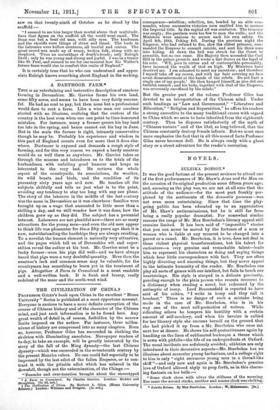A DARTMOOR FARM.*
Tim is an entertaining and instructive description of amateur farming in Devonshire. Mr. Garvice farms his own land, some fifty acres, and seems to have been very fairly success- ful. He had no rent to pay, but then none but a professional would dare to rent a farm. Like a wise man our amateur started with no illusions, realizing that the custom of the country is the best even when one can point to time-honoured mistakes. For instance, many a farmer grazes his bay land too late in the spring, and hence cannot cut his hay in June. But in the main the farmer is right, intensely conservative though he may be. Probably his experience and wisdom in this part of England counts even for more that it does else- where. Dartmoor is exposed and demands a rough style of farming, and for this very reason we expect a hardy amateur would do as well there as anywhere. Mr. Garvice takes us through the seasons and introduces us to the trials of the husbandman with unfailing good humour and keeps us interested to the very last. He reviews the whole aspect of the countryside, its associations, its weather, its wild beasts and birds, and the condition of its peasantry sixty years ago and now. He touches all the subjects skilfully and tells us just what is to the point, avoiding any tendency to stay too long with any one phase. 'Nile story of the labourer in the middle of the last century leas the same in Devonshire as it was elsewhere : families were brought up on a wage that amounted to little more than a shilling a day, and we still wonder how it was done, how the children grew up as they did. The subject has a perennial interest. Labourers are not plentiful now—there are so many attractions for the young men—and even the old men appear to think life was pleasanter for the.a fifty years ago than it is now, notwithstanding the hardships they are always recalling. To a novelist the human element is naturally very attractive, and the pages which tell us of Devonshire wit and super- stition reveal the author at his best. Mr. Garvice must be a lucky farmer—even his pigs did well—and we have always heard that pigs were a very doubtful quantity. Here then the amateur's luck and common sense may be valuable, for the countryman has something to learn yet in the treatment of pigs. Altogether A Farm in Creamland is a most readable and a well-written book. It is fresh and breezy, really redolent of the moor and the south-west wind.


















































 Previous page
Previous page